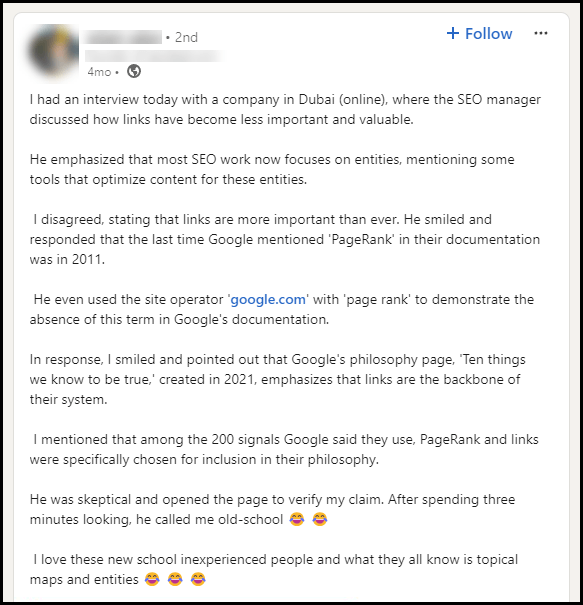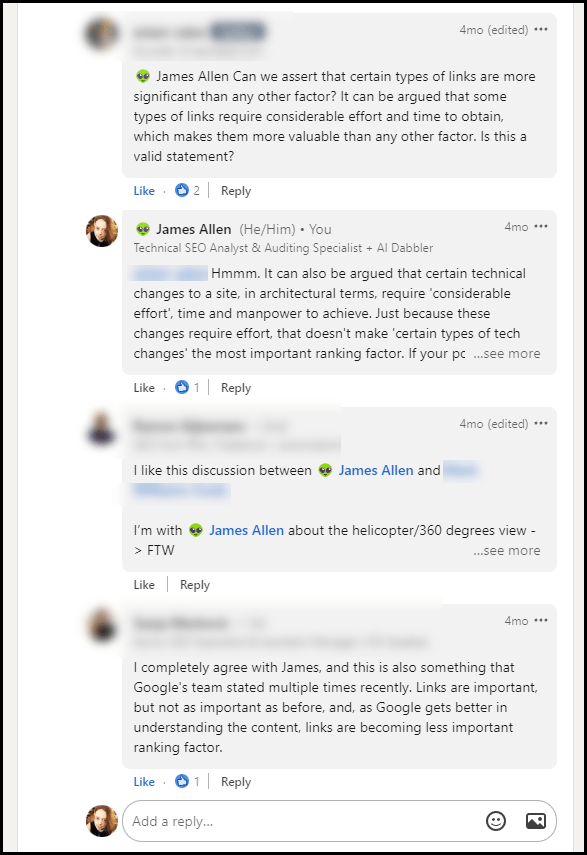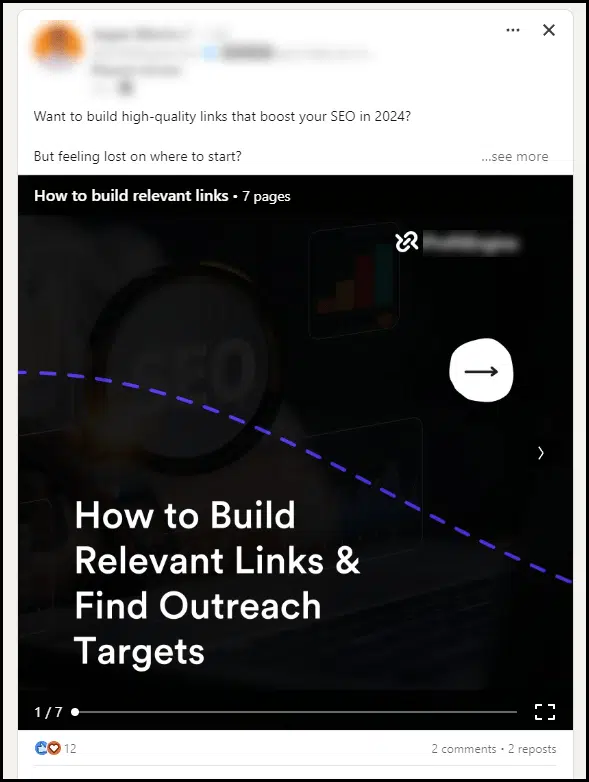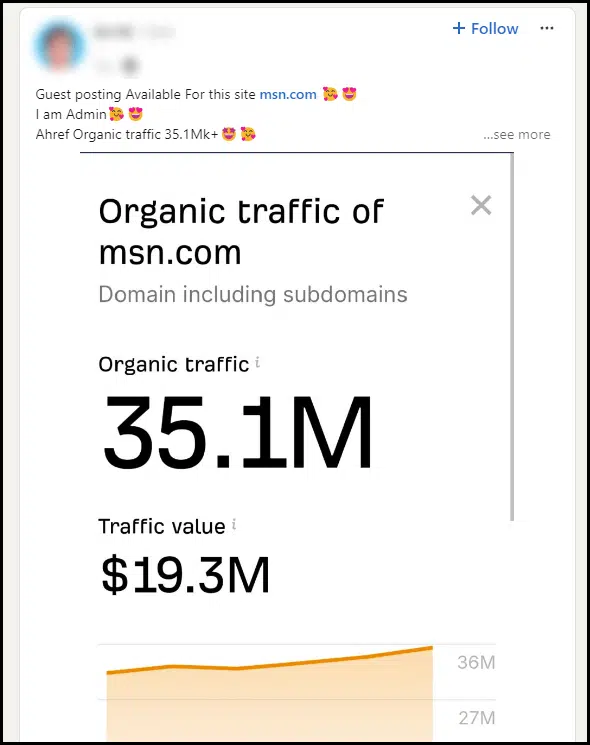SEO today is more complex and challenging than at any other point.
Once upon a time, not too long ago, links were the most important thing in SEO.
But is that still true?
This article will examine the significance of link SEO today. It will include various perspectives within the industry, analyze empirical evidence and consider Google’s recent statements and updates on the role of links in their ranking algorithms.
Backlinks and SEO: Confusion in today’s landscape
Links matter. The volume and quality of external links to a webpage can influence its search rankings.
Beyond the number of links, other factors that play a role include:
- Link diversity (do your links come from multiple sites?).
- Relevance.
- Quality.
- Authority.
Technical aspects and Google’s preference for editorial (non-paid) links further impact effectiveness.
Links create PageRank, which helps elevate keyword rankings. Although Google no longer shows PageRank publicly, it still influences its algorithm.
How much? Opinions vary. Some believe PageRank is crucial, while others think its importance is all but dead.
Just check out this LinkedIn post:

Such posts can lead to interesting discussions that surface interesting views:

Opinions on the importance of links vary widely, leaving many confused.
If you’re among the confused, know you aren’t alone.
So – are links as crucial as sellers claim? Or are links an industry scam costing thousands for unnecessary links?
The truth, as is typically the case, is somewhere in between.
Let’s further examine these perspectives and measure them against the facts.
Google’s statements and updates
Before we proceed, it’s probably prudent to check recent comments from Google.
Let’s start with comments from Gary Illyes, a webmaster trends analyst at Google, from September, as reported here on Search Engine Land:
- “I think they [links] are important, but I think people overestimate the importance of links. I don’t agree it’s in the top three. It hasn’t been for some time.”
Then, in March, Google released a Spam Policy update, removing the word “important” in reference to links as a ranking factor. This change coincided with the March 2024 core algorithm update.
In April, there was a bit of a storm when Illyes indicated that links were less important at a search conference:
- “We need very few links to rank pages… Over the years we’ve made links less important.”
John Mueller, a Google search advocate, also made these comments:
- “My recommendation would be not to focus so much on the absolute count of links. There are many ways that search engines can discover websites, such as with sitemaps. There are more important things for websites nowadays, and over-focusing on links will often result in you wasting your time doing things that don’t make your website better overall.”
Some parts of Google’s documentation still mention links and PageRank as core aspects of its ranking systems.
Within their documentation, Google states that PageRank is:
- “one of our core ranking systems used when Google first launched. Those curious can learn more by reading the original PageRank research paper and patent. How PageRank works has evolved a lot since then, and it continues to be part of our core ranking systems.”
So, even if Google is reducing the prominence of link data within its ranking algorithms, it seems that will be a gradual sunset.
And here’s what Google’s philosophy page says:
- “We assess the importance of every web page using more than 200 signals and a variety of techniques, including our patented PageRank™ algorithm, which analyses which sites have been ‘voted’ to be the best sources of information by other pages across the web. As the web gets bigger, this approach actually improves, as each new site is another point of information and another vote to be counted.”
This suggests that links and PageRank are still important in 2024. However, if you read further:
- “We never manipulate rankings to put our partners higher in our search results and no one can buy better PageRank. Our users trust our objectivity and no short-term gain could ever justify breaching that trust.”
The statement that “no one can buy better PageRank” indicates that Google aggressively defends this part of its ranking algorithm.
It also suggests that Google believes, or wants us to believe, that paid link building services are ineffective. If such services were effective, Google couldn’t claim that no one can buy better PageRank.
This doesn’t mean links are unimportant. But Google invests heavily to make simple link building strategies ineffective.
Despite Google’s efforts to reduce reliance on links and prevent backlink exploitation, the SEO industry still promotes link building as a valid tactic. The industry continues to generate business and educate those they see as uninformed.



These practices will persist unless Google makes radical changes to its ranking algorithms and clearly communicates them to the industry.
Google aims to move away from links to better rank content, but what could replace PageRank?
For now, nothing.
However, with Google’s AI capabilities, this could change.
If Google can evaluate content usefulness directly without external links, they won’t need to rank webpages anymore. Instead, responding to search queries will become an exercise in AI-driven, technical content extraction and surfacing.
This shift seems inevitable.
Empirical evidence and studies
The key question to ask when it comes to your SEO efforts is: “Do links work right now?”
Let’s look at findings from Ahrefs, Backlinko and MonsterInsights:
Study 1: Ahrefs backlink statistics and findings
Ahrefs – a platform for backlink analysis, keyword indexing, content optimization, and cloud-based technical SEO auditing – updated its SEO Statistics for 2024 on March 18.
Ahrefs found a positive correlation between the number of sites linking to a page and that page’s ranking and SEO traffic performance. Most top-ranked pages gain between 5% and 14% more followed links per month.
Many other stats from Ahrefs reference publishers like Authority Hacker and include survey-based data.
Study 2: Backlinko search ranking findings
“A site’s overall link authority (as measured by Ahrefs Domain Rating) strongly correlates with higher rankings,” according to a Backlinko study, updated on March 24.
Google doesn’t use SEO tool scores in its algorithms, but it still uses PageRank. Ahrefs Domain Rating is designed to simulate PageRank, so a correlation is expected if Ahrefs is accurate.
Backlinko’s study also said:
- “Pages with lots of backlinks rank above pages that don’t have as many backlinks. In fact, the #1 result in Google has an average of 3.8x more backlinks than positions #2-#10.”
However, correlation doesn’t imply causation. High rankings can make a page more visible, leading to more backlinks and citations. Still, the correlation between link authority and higher rankings is strong.
- “We found no correlation between page loading speed (as measured by Alexa) and first page Google rankings.”
The point above is slightly misleading. Google doesn’t adjust rankings based on Alexa page-speed ratings. Instead, they use Core Web Vitals to assess page performance. Therefore, this statement might be based on poor input data.
On to the next point:
- “Getting backlinks from multiple different sites appears to be important for SEO. We found the number of domains linking to a page had a correlation with rankings.”
The importance of link diversity is generally accepted within the search community.
Study 3: Monster Insights Ranking Factor Findings
Monster Insights, a WordPress plugin provider, determined that backlinks “have a huge influence on Google’s ranking algorithm,” in January.
Monster Insights concluded that sites with higher volumes of backlinks usually achieve higher Google ranking positions (on average):
- “All in all, backlinks from high authority websites are more valuable, and will boost your rankings more, than links from lower rated sites. Acquiring these links sends a signal to Google that your content is trustworthy, since other high-quality websites vouch for it.”
Making sense of link data and associated claims
While most studies show a correlation between links, rankings and search traffic, they don’t address causality.
Do links cause pages to rank higher, or do high-ranking pages attract more links?
This has been a major debate in SEO for over a decade.
Some have had success with link building, while others have seen no results or even received a manual action from Google.
I trust Ahrefs’ study the most because it provides tools and data without selling link building services, reducing bias. They have a massive index of over 14 trillion live backlinks.
Understanding the role of backlinks in 2024
Your main takeaway is that links still matter now.
However, traditional link building, which often produces poor-quality links, has been ineffective for some time.
Success requires creative ideas and real-world events that garner high-tier editorial coverage.
Don’t “build” links. Earn and attract links. Producing links isn’t as simple as stacking blocks.
While backlinks are becoming less important, they are still an important part of SEO.
Adopting a holistic and quality-focused approach in link acquisition and broader SEO strategies will likely yield the best results in this changing landscape.
Opinions expressed in this article are those of the guest author and not necessarily Search Engine Land. Staff authors are listed here.
Source link : Searchengineland.com
